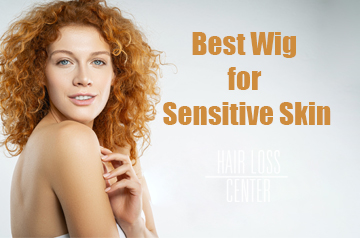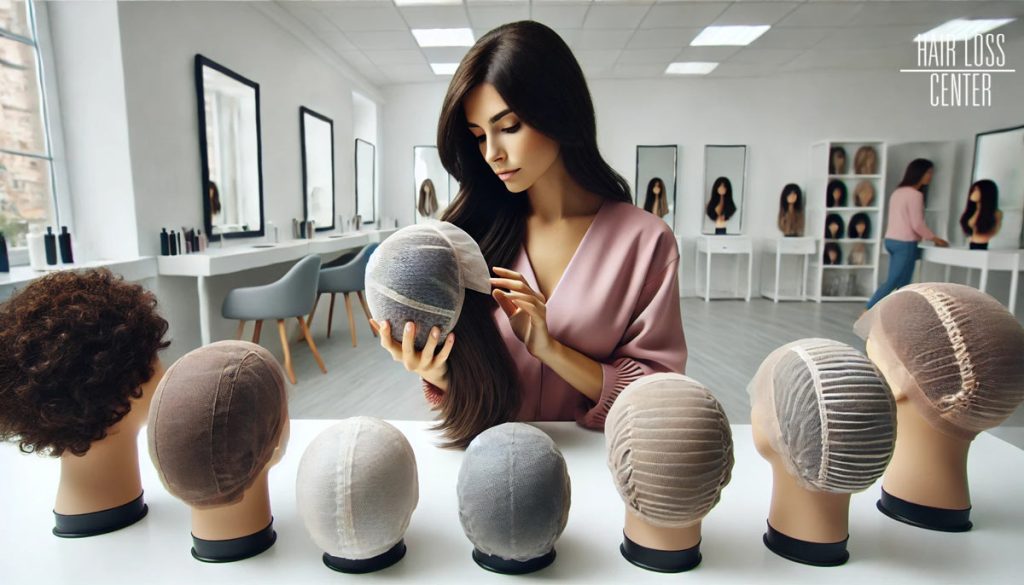

How to Choose the Best Wig for Sensitive Skin: Hypoallergenic Wigs, Care Tips, and Comfort Solutions
Wearing a wig is about more than just enhancing your appearance—it’s about comfort, confidence, and ensuring your skin remains healthy. For individuals with sensitive skin, choosing the right wig can be a challenging process, as certain materials or construction methods may lead to irritation, itching, or even allergic reactions. Whether you’re dealing with hair loss due to medical conditions like chemotherapy or alopecia, or simply looking for a change in style, selecting a wig designed for sensitive skin is crucial to ensure a comfortable and enjoyable experience.
In this comprehensive guide, we will explore the key factors to consider when choosing a wig for sensitive skin. From hypoallergenic wig materials to breathable wig caps and proper wig care, we’ll provide you with the expert advice needed to make an informed decision. At Newport Hair Loss Center, we specialize in wigs that prioritize your comfort and scalp health, allowing you to enjoy both beauty and peace of mind.
Understanding Sensitive Skin and How It Affects Wig Choice
Sensitive skin is a common condition, particularly for individuals experiencing hair loss due to medical treatments or autoimmune disorders. The scalp, being more delicate than other parts of the body, is especially prone to irritation from certain wig materials or improper wig construction. For those with sensitive skin, wearing a wig that doesn’t accommodate their needs can quickly become uncomfortable, leading to redness, itching, or even painful rashes.
Common Symptoms of Sensitive Skin

Sensitive skin often presents itself through a variety of symptoms that can range from mild to severe discomfort. Some of the most common signs include:
- Itching
- Redness and Inflammation
- Rashes and Breakouts
- Tightness or Burning Sensations
How Sensitive Skin Affects Wig Choice
Understanding how sensitive skin reacts to various stimuli is the first step toward selecting the right wig. For people with sensitive skin, comfort is just as important as style. Synthetic wigs often contain chemicals or treatments that can aggravate the skin, while natural human hair wigs tend to be more breathable and gentle. Choosing the right material and wig cap is essential to minimize irritation and ensure a comfortable experience.
Need help identifying the best wig materials for your sensitive scalp? Reach out to our experts at Newport Hair Loss Center.
The Role of Scalp Health
Maintaining scalp health is crucial to wearing wigs comfortably, especially for those with sensitive skin. The scalp is part of the body’s skin ecosystem and needs just as much care and attention. Because wigs can trap moisture, heat, and oils, the scalp is more prone to irritation. Choosing wigs made from breathable materials and ensuring a proper fit can help maintain scalp health and prevent flare-ups of skin irritation.
How to Assess Skin Sensitivity Before Purchasing a Wig
Before purchasing a wig, it’s important to assess how sensitive your skin is to various materials. Conducting a patch test is a simple way to determine whether you may have an allergic reaction to the wig’s materials. Apply a small section of the wig material to a sensitive part of your skin, such as behind your ear or on the inner forearm. Leave it on for a few hours and check for signs of irritation like redness or itching. If no reaction occurs, the material is likely safe for your sensitive scalp.
Opt for Hypoallergenic and Breathable Wig Materials for Sensitive Skin
One of the most critical factors in selecting a wig for sensitive skin is the choice of materials. Wig materials vary greatly, from the type of hair used to the inner cap construction. Opting for hypoallergenic and breathable materials is essential to prevent irritation and keep your scalp comfortable throughout the day.
Human Hair Wigs vs. Synthetic Wigs
When choosing a wig, the first major decision is whether to opt for a human hair wig or a synthetic wig. Each has its advantages and drawbacks, particularly for individuals with sensitive skin.
- Human Hair Wigs: Human hair wigs are typically considered the best option for individuals with sensitive skin. Made from natural fibers, they are less likely to cause irritation and offer better breathability than synthetic alternatives. Human hair wigs also provide a more natural look and feel, though they require more maintenance and tend to be more expensive. However, with proper care, they can be a long-lasting and comfortable choice for sensitive scalps.
- Synthetic Wigs: Synthetic wigs are usually more affordable and easier to maintain, but they may not always be the best option for sensitive skin. Many synthetic wigs contain chemicals and dyes that can trigger allergic reactions. Additionally, synthetic fibers often trap heat and moisture, exacerbating scalp irritation. However, some high-quality synthetic wigs are designed to mimic natural hair while offering hypoallergenic options.
Take a look at the human hair wig collection at Newport Hair Loss Center now!
Hypoallergenic Wig Cap Materials
The wig cap—the part that sits directly on your scalp—is just as important as the hair itself when considering comfort for sensitive skin. Wig caps made from hypoallergenic and breathable materials can greatly reduce irritation. Some of the best options for sensitive skin include:
- Silk and Bamboo Linings: Silk and bamboo are natural fibers that are soft and gentle on sensitive skin. Silk is lightweight, smooth, and breathable, while bamboo offers antibacterial and moisture-wicking properties, making both materials ideal for long-term wear without causing discomfort.
- Monofilament Caps: Monofilament caps use a thin layer of breathable mesh material that allows airflow and reduces heat buildup. The hand-tied construction minimizes friction on the scalp, making it an excellent option for individuals with sensitive skin.
- Lace Front Wigs: Lace front wigs are designed with a sheer lace panel along the front hairline, offering a natural look. However, if the lace material is too rough, it can cause irritation. Many lace front wigs now come with softer lace materials to reduce discomfort.
Choosing the Right Wig Cap

Selecting the right wig cap is a critical factor in ensuring comfort for sensitive skin. The wig cap forms the foundation of the wig and affects how it feels against your scalp over long periods. A poorly constructed or improperly fitted wig cap can lead to heat buildup, friction, and irritation.
Breathable and Soft Wig Caps
The most essential feature of a wig cap for sensitive skin is its breathability. Breathable caps allow air to circulate, preventing moisture and heat from being trapped underneath the wig. This helps control sweat and keeps your scalp dry, reducing the chances of irritation.
- Moisture Control: Wig caps that trap moisture can lead to sweat buildup on the scalp, creating an uncomfortable environment. Breathable caps help wick away moisture, keeping your scalp dry.
- Reduced Heat Buildup: Caps made from lightweight, breathable materials such as lace, mesh, or monofilament allow for better ventilation, preventing the scalp from overheating, which can cause itching or inflammation.
- Soft, Gentle Fabrics: In addition to breathability, choosing a wig cap made from soft, hypoallergenic fabrics such as cotton, bamboo, or silk will reduce friction and prevent redness or discomfort.
Monofilament and Hand-Tied Wig Caps
Monofilament and hand-tied wig caps are popular options for individuals with sensitive skin. These caps are designed with comfort and flexibility in mind:
- Monofilament Caps: These caps use a single, ultra-thin layer of breathable mesh that mimics natural hair growth. The lightweight, soft design allows for better airflow and reduces pressure points on the scalp.
- Hand-Tied Caps: In hand-tied wigs, each strand of hair is individually tied to the cap, providing more natural movement and reducing friction. Hand-tied caps conform to the shape of your head, creating fewer areas of tightness and offering increased comfort for sensitive skin.
Proper Wig Fit to Prevent Irritation
A well-fitted wig is essential for ensuring long-term comfort, particularly for individuals with sensitive skin. A wig that is too tight can create pressure on the scalp, leading to soreness or breakouts, while a wig that is too loose may shift and cause friction. Achieving the perfect balance between a secure fit and comfort is crucial to preventing irritation.
How to Measure Your Head for a Wig
Accurately measuring your head is the first step to achieving the perfect wig fit. Here’s how to measure your head correctly:
- Circumference: Use a soft measuring tape to measure the circumference of your head by placing the tape at your hairline, going behind your ears, and around the nape of your neck.
- Front to Nape: Measure from your hairline at the center of your forehead to the nape of your neck.
- Ear to Ear: Measure from the top of one ear, across the crown of your head, to the top of the other ear.
Once you have these measurements, you can select the correct wig size—small, medium, or large—ensuring a snug yet comfortable fit.
Using Adjustable Straps and Wig Grips
Many wigs come with adjustable straps or elastic bands that allow you to fine-tune the fit. Wig grips, made from soft materials like velvet or silicone, can help hold the wig in place without applying too much pressure on your scalp.
Need help finding the perfect fit? Schedule a fitting appointment at Newport Hair Loss Center today!
Wig Care for Sensitive Skin
Proper wig care is essential to maintaining comfort and preventing irritation. Both human hair and synthetic wigs require regular cleaning to remove dirt, sweat, and environmental pollutants that can clog pores and irritate the scalp. Using hypoallergenic wig shampoos and conditioners will help keep your wig and scalp clean without introducing harsh chemicals.
- Cleaning Your Wig: Wash your wig every 7–10 wears or more frequently if you use styling products. Always use cool or lukewarm water to avoid damaging the fibers.
- Storing Your Wig Properly: Store your wig on a wig stand or mannequin to maintain its shape and allow it to breathe. Avoid storing it in plastic bags, which can trap moisture and lead to unpleasant odors or mildew.
Read this article from Healthline on the best hair care tips for people with sensitive scalps.
FAQ: Choosing the Right Wig for Sensitive Skin
1. What materials are best for wigs if I have sensitive skin?
If you have sensitive skin, it’s important to choose hypoallergenic and breathable materials. Natural fibers like human hair, silk, and bamboo are excellent choices as they are soft, gentle, and reduce the risk of irritation. For wig caps, consider monofilament or hand-tied constructions, which allow for better airflow and reduce friction on the scalp.
2. How do I know if a wig is causing my skin irritation?
Wig-related skin irritation can manifest as itching, redness, or even small bumps on the scalp. If you notice these symptoms, your wig may be too tight, made from irritating materials, or trapping moisture against your scalp. Conduct a patch test with the wig material before wearing it to see if you have an allergic reaction. If irritation occurs, switching to hypoallergenic wigs or using a wig liner can help alleviate discomfort.
3. Are synthetic wigs bad for sensitive skin?
Not necessarily, but many synthetic wigs contain chemicals or fibers that can irritate sensitive skin. If you prefer synthetic wigs, look for those labeled as medical-grade or heat-friendly, which are often designed with hypoallergenic materials. Also, avoid wigs treated with harsh chemicals or dyes, and ensure that the cap is breathable and lightweight to minimize irritation.
4. How can I prevent my wig from overheating my scalp?
To prevent your scalp from overheating, choose a wig with a breathable cap such as lace front, monofilament, or hand-tied wigs. These allow air to circulate, reducing heat buildup. Additionally, wearing a wig liner made from moisture-wicking materials like cotton or bamboo can absorb sweat and keep your scalp cool. Lightweight wigs and avoiding tight-fitting caps can also help maintain airflow.
5. How often should I clean my wig if I have sensitive skin?
If you have sensitive skin, it’s recommended to clean your wig after every 7–10 wears, or more frequently if you use a lot of styling products. Use hypoallergenic, sulfate-free shampoos and conditioners designed specifically for wigs. Regular cleaning will remove oils, dirt, and bacteria, helping to prevent irritation and keep your scalp healthy.
6. What is the best way to ensure my wig fits comfortably?
For maximum comfort, it’s important to measure your head accurately before purchasing a wig. Make sure to choose the correct wig size—small, medium, or large—and use wigs with adjustable straps or elastic bands to fine-tune the fit. If your wig is too tight, it can cause friction and pressure points. Wig grips and liners can also help ensure a secure fit without causing strain on the scalp.
Bringing It All Together: Find Your Ideal Wig for Sensitive Skin at Newport Hair Loss Center
Choosing the right wig for sensitive skin involves more than just finding a style that suits you—it’s about ensuring comfort, breathability, and scalp health. By opting for hypoallergenic materials, ensuring a proper fit, and following a regular wig care routine, you can enjoy wearing your wig without discomfort. At Newport Hair Loss Center, we offer high-quality, custom-made wigs designed specifically for individuals with sensitive skin. With the right wig and proper care, you can embrace both beauty and comfort, knowing that your scalp is well-protected and healthy.
For more information or assistance in selecting the perfect wig for sensitive skin in Orange County (949-322-9555), San Diego (949-640-4247), and Los Angeles (310-991-0087) contact Newport Hair Loss Center today. Our team of experts is here to help you find the ideal solution for your needs.
LA OFFICE
Beverly Hills
8383 Wilshire Blvd, First Floor
Los Angeles, CA 90211
ORANGE COUNTY OFFICE
NEWPORT BEACH
240 Newport Center Drive, Suite 111
Newport Beach, CA 92660
SAN DIEGO OFFICE
LA JOLLA
4660 La Jolla Village Dr. Suite100
San Diego, CA 92122
NEWPORT HAIR LOSS CENTER
Newport Hair Loss Center gives hair loss sufferers a way to restore their appearance and boost their confidence, whether they are suffering from trichotillomania, alopecia, or are currently going through chemotherapy.
Site Map

